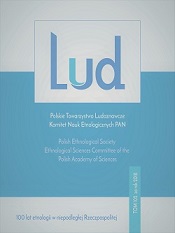STUDIUM HISTORII KULTURY MATERIALNEJ (1950-1956). KONTEKST POLITYCZNY, IDEOLOGICZNY I GOSPODARCZY „LIKWIDACJI” ETNOLOGII W POLSCE
DEPARTMENT OF THE HISTORY OF MATERIAL CULTURE (1950-1956). THE POLITICAL, IDEOLOGICAL AND ECONOMIC CONTEXT OF THE ‘ELIMINATION’ OF ETHNOLOGY IN POLAND
Author(s): Filip WróblewskiSubject(s): Archaeology, Cultural Anthropology / Ethnology, Post-War period (1950 - 1989), History of Communism
Published by: Polskie Towarzystwo Ludoznawcze
Keywords: history of anthropology; archeology; reform of higher education; communism; dialectical materialism; ideology; usefulness; applied anthropology;
Summary/Abstract: In the article, the author discusses the process of marginalization and ‘elimination’ of ethnology by the communist authorities of the Polish People’s Republic, as an independent scientific discipline. In place of ‘bourgeois’ or ‘reactionary’ sciences, and therefore inconsistent with the doctrine of dialectical materialism in force at the turn of the 1940s and 1950s, the history of material culture was established. The new field of study has replaced so far separate ones: ethnology (anthropology), archeology of Poland and classical archeology. The establishment of DHMC was related to profiling graduates in terms of the needs of a centrally planned economy and conducting research that was supposed to provide evidence for the superiority of socialism over capitalism. The article discusses the influence of ideology on scientific activity and presents the involvement of scholars in the current policy of the communist regime.
Journal: LUD
- Issue Year: 102/2018
- Issue No: 1
- Page Range: 123-154
- Page Count: 32
- Language: Polish

